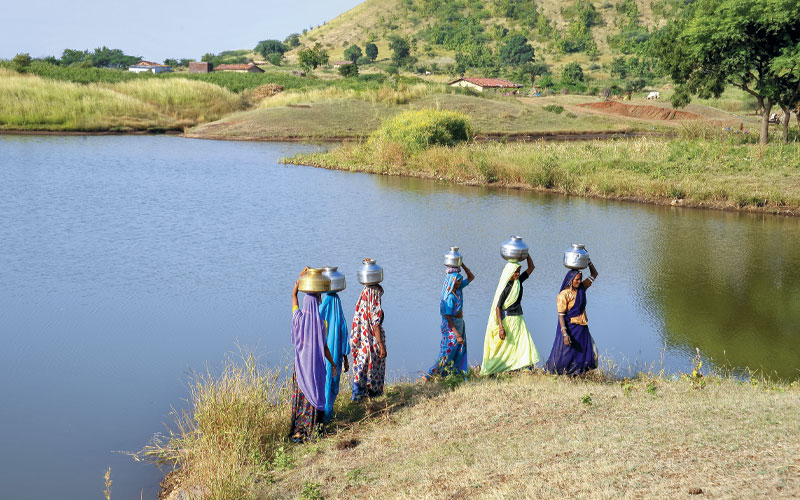
ITC Paperboards and Specialty Papers Division has adopted the Alliance for Water Stewardship (AWS) framework, a globally acknowledged gold standard for assessment of water stewardship approach and initiatives. The framework cognises for interventions undertaken both within the fence, as well and outside the fence at the catchment level.
Water Stewardship
Rapid growth in population, urbanisation and water-intensive patterns of development coupled with climate change have had a significant impact on availability, quality as well as access to water around the world. This vital resource sustains life and industrial operations alike, making water management a critical challenge especially in countries like India, where agriculture supports a significant portion of the population. It is thus imperative to take collective and immediate action to ensure a sustainable supply of water. Recognizing this urgency, ITC adopts a comprehensive and forward-thinking approach to water management. ITC’s integrated water strategy – comprehensive measures across all operating units combined with large-scale water harvesting through its Watershed Development Interventions beyond the fence – has enabled it to be Water Positive for 21 consecutive years. Our 3-fold approach to water management can be categorized into: Large-scale Integrated Watershed Development initiative; Demand side management – Enhancing agricultural water use efficiency; and within units – Maximising water efficiency across all operations.
Ensuring Water Efficiency
All units implement action plans to work towards reducing net water consumption, maximising rainwater harvesting and achieving zero effluent discharge through technology upgradation, advanced processes, stringent audits and international benchmarking.
ITC has adopted the Alliance for Water Stewardship (AWS) framework, a globally acknowledged gold standard for assessment of water stewardship approach and initiatives. The framework cognises for interventions undertaken both within the fence, as well and outside the fence at the catchment level. ITC PSPD Unit Kovai is the second facility in the world and the first in India to be awarded the Alliance for Water Stewardship (AWS) Platinum level certification, the highest recognition for water stewardship in the world.
Consumption, Recycle and Solutions
ITC PSPD’s total water intake for 2022-23 was around 30 mn KL. Specific water consumption has reduced by 9% over the baseline year of 2018-19 despite expansion in operations.
There are continued efforts to minimise fresh water consumption, while maximising reuse and recycling of treated effluent across all manufacturing units. During the year, several initiatives were undertaken in our factories for reusing discharged water from one process in another. For instance, Unit Bhadrachalam has been utilizing the return sealing water from pumps in cooling towers, thereby reducing freshwater intake by around 1,500 kl/day. Total daily water savings of 2,900 kl were achieved in Unit Bhadrachalam through recovering and reuse of water in plant processes in 2022-23. A major portion of treated discharge is used for irrigation outside the factory premises. Since 2010-11, Unit Kovai has not discharged any treated effluent outside its premises. The Unit also optimizes fresh water utilisation in process through kaizen approach, leading to a daily saving of roughly 85 kl in 2022-23.
Watch: Top Paper Companies 2023
So far, the company has created over 28,300 water harvesting structures in agri-catchments, out of which more than 3,100 water harvesting and ground water recharge structures have been constructed during 2022-23.
Water Harvesting and Reliance
Over the years, ITC has created rainwater harvesting potential through extensive investments in its Integrated Watershed Development Projects. The programme promotes the development and management of local water resources in moisture-stressed areas by facilitating community participation in planning and implementing such measures, whilst building, reviving and maintaining water harvesting structures. ITC supports small and marginal farmers to form Water User Groups (WUGs), thereby ensuring community-based participatory management of local water resources. Water harvesting structures are built and low-cost technologies employed to arrest erosion, enhance moisture retention, conserve rainwater and recharge groundwater.
The coverage of the Integrated Watershed Development projects extends to 45 districts across 16 States in India, covering over 1.47 million acres of land. So far, the company has created over 28,300 water harvesting structures in agri-catchments, out of which more than 3,100 water harvesting and ground water recharge structures have been constructed during 2022-23. As on 31st March 2023, a total rainwater harvesting potential (RWH) of nearly 50 million kl has been created, which is over three times the net water consumed by ITC’s operations in FY 2022-23.
Water Reduction Target
ITC is targeting the creation of rainwater harvesting potential equivalent to over 5 times the net water consumption from operations by 2030. To achieve this, ITC’s Mission Sunehra Kal will create a total rainwater harvesting potential (RWH) of 60 million kl by 2030.
The road ahead:
- Continued efforts to minimise fresh water consumption, while maximising reuse and recycling of treated effluent across all manufacturing units.
- Working with farmers to reduce water consumption through water efficient irrigation and farm practices.
- Periodic site-level vulnerability assessment to identify high water stressed sites, and deployment of interventions for mitigating water stress.
- Continuous Assessment for Validating the Efficacy of Interventions – Expand coverage of Alliance for Water Stewardship (AWS) Certification.
Also Read: TNPL: Reimagining Water Usage to Set a Precedent
Case-Study:
Water Stewardship Efforts in ITC PSPD Unit Kovai, Tamil Nadu
ITC PSPD Unit Kovai, Tamil Nadu, which manufactures paperboard from reclaimed post-consumer and post-industrial fibre, obtains its water from a stream which is part of the Upper Bhawani River Basin. The river is prone to water security risks, resulting from erratic climatic conditions, excessive unplanned and unsustainable water usage and rapidly declining groundwater levels in the basin. In order to address the above, ITC through its Mission Sunehra Kal programme, started working towards a watershed management strategy in the catchment, involving a collaborative, multi-stakeholder and consensus-based approach. In partnership with WWF India, an expert assessment of the hydrogeology was done and a host of water stewardship initiatives were implemented in the identified priority area – 20,709 hectares, with 29 micro watersheds spread across 8 panchayats, 149 villages and around 14,000 households.
Within the Unit, ITC has implemented various measures since 2015-16 to ensure maximum water use efficiency, such as reducing specific water consumption by 5% year-on-year, increasing the recycling of Effluent Treatment Plant (ETP) water from 40% to 60%, improving internal water governance and ensuring safe drinking water, sanitation and hygiene services to all its employees.
Since 2010-11, Unit Kovai has not discharged any treated effluent outside its premises. The Unit also optimizes fresh water utilisation in process through kaizen approach, leading to a daily saving of roughly 85 kl in 2022-23.
On the supply side, interventions such as creation of water harvesting and recharge structures, deep farm ponds and open wells, as well as rejuvenation of traditional water harvesting structures were initiated. Owing to the agri-dependent nature of the catchment, various demand-side interventions were undertaken as well. To improve water governance in the region, Water User Groups (WUGs) with farmers, Self Help Groups of women and multi-stakeholder committees with local public sector agencies, Tamil Nadu Agriculture University, Krishi Vigyan Kendra and Block Panchayats were formed with ITC’s support. Training workshops on water saving practices, awareness raising campaigns on the state of groundwater in the area, farmer field schools and demonstration plots were also implemented. Additionally, on the supply-side efforts, water harvesting potential of 1.01 Million kl has been created so far by the rejuvenation of traditional water harvesting structures and construction of new structures in the catchment area such as village ponds, check dams, etc. From the demand-side efforts, the benefits have reached over 5,000 farmers, resulting in savings of 8.51 Million kl of water. These savings are around 8 times compared to the average annual water withdrawal at Kovai Unit (1.0 Million kl).
As a recognition for its efforts, in October 2019, the unit earned Platinum certification against the Alliance for Water Stewardship (AWS) Standard, which is a credible and globally applicable framework for major water users to understand their own water use and impacts, and to work collaboratively and transparently with others for sustainable water management within catchment area.




